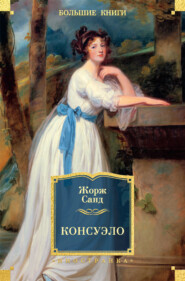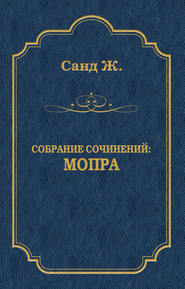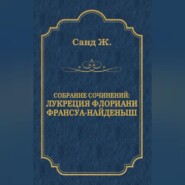По всем вопросам обращайтесь на: info@litportal.ru
(©) 2003-2025.
✖
The George Sand-Gustave Flaubert Letters
Настройки чтения
Размер шрифта
Высота строк
Поля
You are sad, poor friend and dear master; it was you of whom I thought on learning of Duveyrier's death. Since you loved him, I am sorry for you. That loss is added to others. How we keep these dead souls in our hearts. Each one of us carries within himself his necropolis.
I am entirely UNDONE since your departure; it seems to me as if I had not seen you for ten years. My one subject of conversation with my mother is you, everyone here loves you. Under what star were you born, pray, to unite in your person such diverse qualities, so numerous and so rare?
I don't know what sort of feeling I have for you, but I have a particular tenderness for you, and one I have never felt for anyone, up to now. We understood each other, didn't we, that was good.
I especially missed you last evening at ten o'clock. There was a fire at my wood-seller's. The sky was rose color and the Seine the color of gooseberry sirup. I worked at the engine for three hours and I came home as worn out as the Turk with the giraffe.
A newspaper in Rouen, le Nouvelliste, told of your visit to Rouen, so that Saturday after leaving you I met several bourgeois indignant at me for not exhibiting you. The best thing was said to me by a former sub-prefect: "Ah! if we had known that she was here … we would have … we would have …" he hunted five minutes for the word; "we would have smiled for her." That would have been very little, would it not?
To "love you more" is hard for me – but I embrace you tenderly. Your letter of this morning, so melancholy, reached the BOTTOM of my heart. We separated at the moment when many things were on the point of coming to our lips. All the doors between us two are not yet open. You inspire me with a great respect and I do not dare to question you.
XXVII. TO GUSTAVE FLAUBERT, at Croisset
Paris, 13 November, 1866 Night from Tuesday to Wednesday
I have not yet read my play. I have still something to do over. Nothing pressing. Bouilhet's play goes admirably well, and they told me that my little friend Cadol's [Footnote: Edward Cadol, a dramatic author and a friend of Maurice Sand.] play would come next. And, for nothing in the world, do I want to step on the body of that child. That puts me quite a distance off and does not annoy me – NOR INJURE ME AT ALL. What style! Luckily I am not writing for Buloz.
I saw your friend last evening in the foyer at the Odeon. I shook hands with him. He had a happy look. And then I talked with Duquesnel about the fairy play. He wants very much to know it. You have only to present yourself when ever you wish to busy yourself with it. You will be received with open arms.
Mario Proth will give me tomorrow or next day the exact date on the transformation of the journal. Tomorrow I shall go out and buy your dear mother's shoes. Next week I am going to Palaiseau and I shall hunt up my book on faience. If I forget anything, remind me of it.
I have been ill for two days. I am cured. Your letter does my heart good. I shall answer all the questions quite nicely, as you have answered mine. One is happy, don't you think so, to be able to relate one's whole life? It is much less complicated than the bourgeois think, and the mysteries that one can reveal to a friend are always the contrary of what indifferent ones suppose.
I was very happy that week with you: no care, a good nesting-place a lovely country, affectionate hearts and your beautiful and frank face which has a somewhat paternal air. Age has nothing to do with it. One feels in you the protection of infinite goodness, and one evening when you called your mother "MY DAUGHTER," two tears came in my eyes. It was hard to go away, but I hindered your work, and then, – and then, – a malady of my old age is, not being able to keep still. I am afraid of getting too attached and of wearying others. The old ought to be extremely discreet. From a distance I can tell you how much I love you without the fear of repetition. You are one of the RARE BEINGS remaining impressionable, sincere, loving art, not corrupted by ambition, not drunk with success. In short you will always be twenty-five years of age because of all sorts of ideas which have become old-fashioned according to the senile young men of today. With them, I think it is decidedly a pose, but it is so stupid! If it is a weakness, it is still worse. They are MEN OF LETTERS and not MEN. Good luck to the novel! It is exquisite; but oddly enough there is one entire side of you which does not betray itself in what you do, something that you probably are ignorant of. That will come later, I am sure of it.
I embrace you tenderly, and your mother too, and the charming niece! [Footnote: Madame Caroline Commanville.] Ah! I forgot, I saw Couture this evening; he told me that in order to be nice to you, he would make your portrait in crayon like mine for whatever price you wish to arrange. You see I am a good commissioner, use me.
XXVIII. TO GUSTAVE FLAUBERT 16 November, 1866
Thanks, dear friend of my heart, for all the trouble that I gave you with my Berrichon Despruneaux. They are friends from the old country, a whole adorable family of fine people, fathers, children, wives, nephews, all in the close circle at Nohant. He must have been MOVED at seeing you. He looked forward to it, all personal interest aside. And I who am not practical, forgot to tell you that the judgment would not be given for a fortnight. That in consequence any preceding within the next two weeks would be extremely useful. If he gains his suit relative to the constructions at Yport, he will settle there and I shall realize the plan formed long since of going every year to his house; he has a delicious wife and they have loved me a long time. You then are threatened with seeing me often scratching at your gate in passing, giving you a kiss on the forehead, crying courage for your labor and running on. I am still awaiting our information on the journal. It seems that it is a little difficult to be exact for '42. I have asked for the most scrupulous exactitude.
For two days I have been taking out to walk my Cascaret, [Footnote: Francis Laur.] the little engineer of whom I told you. He has become very good looking, the ladies lift their lorgnons at him, and it depends only on him to attain the dignity of a negro "giraffier," but he loves, he is engaged, he has four years to wait, to work to make himself a position, and he has made a vow. You would tell him that he is stupid, I preach to him, on the contrary, my old troubadour doctrine.
Morality aside, I don't think that the children of this day have sufficient force to manage at the same time, science and dissipation, cocottes and engagements. The proof is that nothing comes from young Bohemia any longer. Good night, friend, work well, sleep well. Walk a little for the love of God and of me. Tell your judges who promised me a smile, to smile on my Berrichon.
XXIX. TO GUSTAVE FLAUBERT 16 November, 1866
Don't take any further steps. Contrary to all anticipations,
Despruneaux has gained his suit during the session.
Whether you have done it or not, he is none the less grateful about it and charges me to thank you with all his good and honest heart.
Bouilhet goes from better to better. I have just seen the directors who are delighted.
I love you and embrace you.
Think sometimes of your old troubadour. Friday
G. Sand
XXX. TO GUSTAVE FLAUBERT 18 November (?), 1866
I think that I shall give you pleasure and joy when I tell you that
La Conjuration d'Ambroise, thus says my porter, is announced as a real money-maker. There was a line this evening as at Villemer, and
Magny which is also a barometer, shows fair weather.
So be content, if that keeps up, Bouilhet is a success. Sunday
G. S.
XXXI. TO GUSTAVE FLAUBERT
Palaiseau, 22 November, 1866
I think that it will bring me luck to say good evening to my dear comrade before starting to work.
I am QUITE ALONE in my little house. The gardener and his family live in the pavilion in the garden and we are the last house at the end of the village, quite isolated in the country, which is a ravishing oasis. Fields, woods, appletrees as in Normandy; not a great river with its steam whistles and infernal chain; a little stream which runs silently under the willows; a silence … ah! it seems to me that I am in the depths of the virgin forest: nothing speaks except the little jet of the spring which ceaselessly piles up diamonds in the moonlight. The flies sleeping in the corners of my room, awaken at the warmth of my fire. They had installed themselves there to die, they come near the lamp, they are seized with a mad gaiety, they buzz, they jump, they laugh, they even have faint inclinations towards love, but it is the hour of death and paf! in the midst of the dance, they fall stiff. It is over, farewell to dancing!
I am sad here just the same. This absolute solitude, which has always been vacation and recreation for me, is shared now by a dead soul [Footnote: Alexandre Manceau, the engraver, a friend of Maurice Sand.] who has ended here, like a lamp which is going out, yet which is here still. I do not consider him unhappy in the region where he is dwelling; but the image that he has left near me, which is nothing more than a reflection, seems to complain because of being unable to speak to me any more.
Never mind! Sadness is not unhealthy. It prevents us from drying up. And you dear friend, what are you doing at this hour? Grubbing also, alone also; for your mother must be in Rouen. Tonight must be beautiful down there too. Do you sometimes think of the "old troubadour of the Inn clock, who still sings and will continue to sing perfect love?" Well! yes, to be sure! You do not believe in chastity, sir, that's your affair. But as for me, I say that SHE HAS SOME GOOD POINTS, THE JADE!
And with this, I embrace you with all my heart, and I am going to, if I can, make people talk who love each other in the old way.
You don't have to write to me when you don't feel like it. No real friendship without ABSOLUTE liberty.
In Paris next week, and then again to Palaiseau, and after that to Nohant. I saw Bouilhet at the Monday performance. I am CRAZY about it. But some of us will applaud at Magny's. I had a cold sweat there, I who am so steady, and I saw everything quite blue.
XXXII. TO GEORGE SAND
Croisset, Tuesday
You are alone and sad down there, I am the same here.
Whence come these attacks of melancholy that overwhelm one at times? They rise like a tide, one feels drowned, one has to flee. I lie prostrate. I do nothing and the tide passes.
My novel is going very badly for the moment. That fact added to the deaths of which I have heard; of Cormenin (a friend of twenty-five years' standing), of Gavarni, and then all the rest, but that will pass. You don't know what it is to stay a whole day with your head in your hands trying to squeeze your unfortunate brain so as to find a word. Ideas come very easily with you, incessantly, like a stream. With me it is a tiny thread of water. Hard labor at art is necessary for me before obtaining a waterfall. Ah! I certainly know THE AGONIES OF STYLE.
In short I pass my life in wearing away my heart and brain, that is the real TRUTH about your friend.
You ask him if he sometimes thinks of his "old troubadour of the clock," most certainly! and he mourns for him. Our nocturnal talks were very precious (there were moments when I restrained myself in order not to KISS you like a big child).
Your ears ought to have burned last night. I dined at my brother's with all his family. There was hardly any conversation except about you, and every one sang your praises, unless perhaps myself, I slandered you as much as possible, dearly beloved master.
I have reread, a propos of your last letter (and by a very natural connection of ideas), that chapter of father Montaigne's entitled "some lines from Virgil." What he said of chastity is precisely what I believe. It is the effort that is fine and not the abstinence in itself. Otherwise shouldn't one curse the flesh like the Catholics? God knows whither that would lead. Now at the risk of repetition and of being a Prudhomme, I insist that your young man is wrong. [Footnote: Refers to Francis Laur.] If he is temperate at twenty years old, he will be a cowardly roue at fifty. Everything has its compensations. The great natures which are good, are above everything generous and don't begrudge the giving of themselves. One must laugh and weep, love, work, enjoy and suffer, in short vibrate as much as possible in all his being.

















